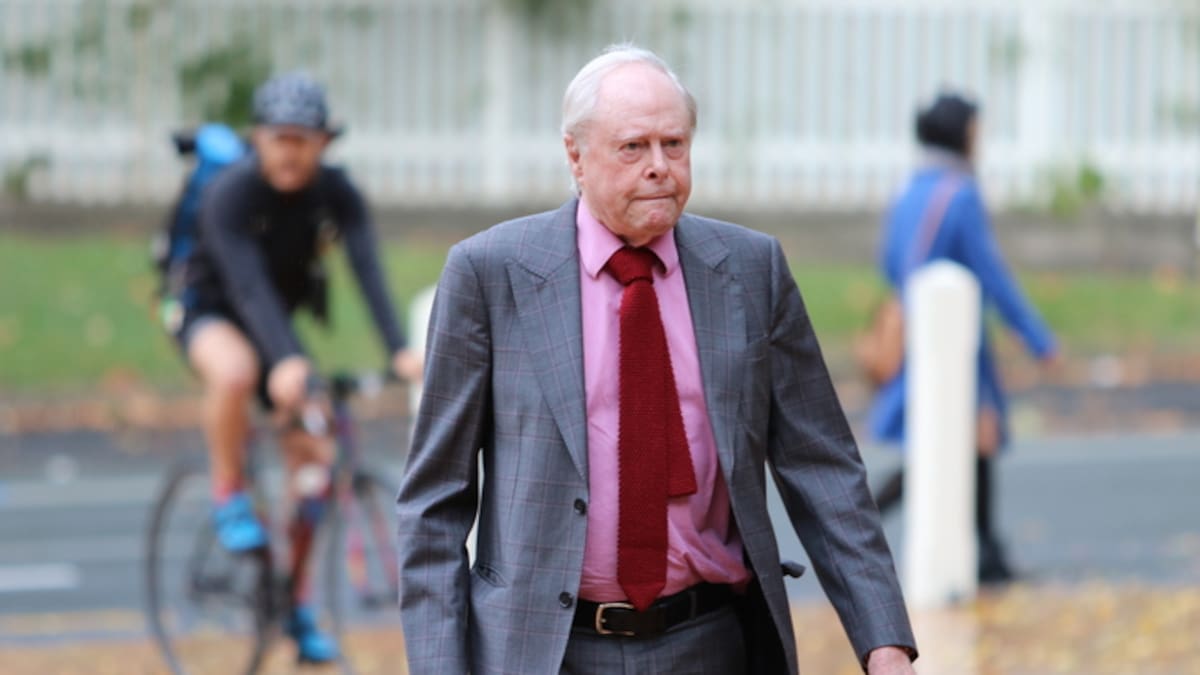
- James Wallace was granted parole in November and released from jail in December last year.
- The disgraced arts patron, who had an estimated net worth of about $170 million, was found guilty of indecently assaulting three male victims at his Auckland mansion in the early 2000s, 2008 and 2016.
- Wallace was sentenced to a prison term of two years and four months in May 2021 after being convicted of the indecent assaults and twice attempting to pervert the course of justice by trying to dissuade a victim from giving evidence against him.
- Today he appeared before the Parole Board asking for a change in his parole conditions, including a request to drink alcohol and leave his home overnight.
Arts patron and convicted sex offender James Hay Wallace continues to protest his innocence and has lodged an application with the Criminal Cases Review Commission, which investigates possible miscarriages of justice.
The admission came during a progress hearing before the Parole Board this afternoon.
Asked if he continued to deny his offending Wallace said “absolutely,” saying to admit anything “would mean the others have won.”
His lawyer David Jones KC told the hearing Wallace had lodged an application with the Criminal Cases Review Commission, an independent Crown entity that can refer a case back to the appeal court when it considers a miscarriage of justice has occurred.
At today’s hearing Wallace sought several variations to his current parole conditions, including the right to drink alcohol and be allowed to leave his Auckland home overnight.
Wallace’s release conditions included that he stayed at the same address every night and not to communicate with his co-offenders, Mika X and Mustafa Erinc Yikar, unless he had written approval of a probation officer.
Wallace said he wanted to travel to Christchurch to oversee the restoration of Christchurch’s McLeans Mansion, which was damaged in the 2011 earthquakes. Wallace told an earlier hearing he planned to turn the property into an arts and community centre.
As the project’s sole supporter, it would be very difficult to fly down for one night when it came time to fit out the building, he said.
Given his age, he also wanted the ability to travel to Dunedin and Whanganui to see friends and artists for a few nights. Probation didn’t oppose the request.
Wallace also requested permission to have contact with Yikar, his former house manager before he was convicted of bribing a witness during an elaborate plot to aid the disgraced rich-lister.
Wallace told the hearing his art-filled mansion Rannoch, also featured a forest and gardens, that needed people to run it. He said since Yikar had left the front gardens were an “utter shambles” and “neglected and overgrown”.
As a result of Yikar’s absence his Amex card hadn’t been paid and his health insurance along with his car registrations and warrants had lapsed.
When Wallace was paroled late last year his release conditions included that any visitors to his house had to be approved by three people.
“That will ensure that Mr Wallace is never placed into the situation where he is able to sexually assault a visitor to his house,” the board’s decision said.
“This provision is fundamental in our view to reducing his risk by eliminating, as well as we are able, the opportunity for offending.”
Today the Board updated that condition, replacing the three people who were identified in his release conditions with two new people who live with him at Rannoch.
Releasing its decision the board removed the clause prohibiting Wallace from drinking alcohol, but kept the condition that he is not allowed to possess, use, or consume, controlled drugs or psychoactive substances except those prescribed by a doctor. It also allowed Wallace to be absent overnight from his Epsom mansion and to have contact with Yikar, providing he had the written approval from his probation officer.
The hearing concluded with the board saying this was the last time they would see Wallace and they wished him well.
Catherine Hutton is an Open Justice reporter, based in Wellington. She has worked as a journalist for 20 years, including at the Waikato Times and RNZ. Most recently she was working as a media advisor at the Ministry of Justice.




 King’s Birthday traffic and weather: Winter sunshine in North Island, drivers experience hour-long queues
King’s Birthday traffic and weather: Winter sunshine in North Island, drivers experience hour-long queues